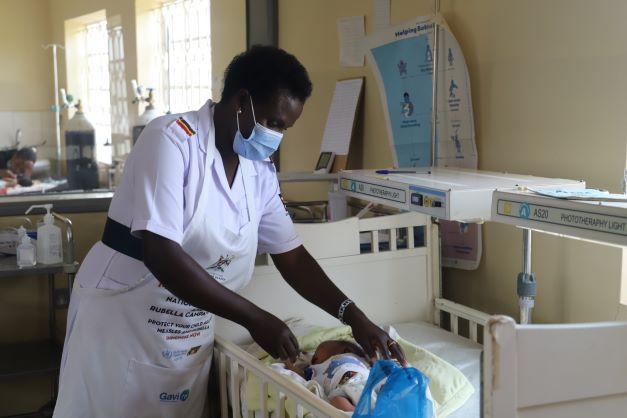Uganda: The Neonatal Intensive Care Unit (NICU) at Rwamwanja Health Centre saves babies
Chantal Uwimana, a Congolese
National is joyful her 3 months’ son old is alive. The baby was delivered preterm
at 7 months with 1.6 kgs. The baby was put in the incubator at the Rwamwanja New-born
Intensive Care Unit (NICU) where new premature born babies and critically ill are
placed for specialised care and management.
Chantal who is all praises for
the nurses at the NICU was discharged after 2 months to take care of her baby at
home after the baby gained the acceptable weight of 2.8 kgs. She says had it
not been the nurses at the NICU who cancelled her and assured her that her baby
would survive, I almost died of pressure, Chantal recounts.
Chantal’s story is not different
for Kakuru Jacqueline, a Congolese national too living in Rwamwanja refugee
settlement. Jacqueline developed malaria at 8 months and delivered her 2nd
born prematurely at 8 months. The baby was 1 kg at birth. The baby was
immediately placed in the new-born intensive care unit for care. After 2 weeks,
she was discharged after her baby gained 2kgs. The baby is 7 months now.
For Atuhaire Sharon’s miracle
baby, Baby Elly was delivered on the way to hospital with 2.6 kgs. At births
baby Elly could not cry like any other normal baby. On reaching Rwamwanja HC
III and upon examination, the baby had a blocked airway, could breastfeed and
breath well. A decision was made to place baby Elly in the new-born intensive
care unit and be put on oxygen. After 2 weeks in the NICU, baby Elly started
crying, breathing and moving his limbs. They were discharged and told to
monitor him from home. Twinomujuni Ezra, the father is all praises for the
midwives at Rwamwanja NICU for saving his son’s life. He says since then they
have never gotten any health problem with baby Elly. He is now 6 months old.
Background to
Rwamwanja HC III
Rwamwanja health centre is a high
volume HC III, serving a big catchment area. It serves a total population of
87,304 people (42, 280 nationals and 45,024 refugees). The facility offers
emergency obstetric surgical services and is a referral for the nearby heath
centre IIIs. On average a month, Rwamwanja delivers a total of 380 babies.
Some of these babies are born
with complications and find themselves admitted into the new-born intensive
care unit for specialised treatment and management. According to Musiime Prever,
the midwife in-charge of the NICU, says on average they receive 30-60 neonatal
complications managed at the facility NICU. Before the establishment of the
NICU, all babies with complications used to be referred to Rukunyu hospital and
Fort Portal hospital and used to lose a number of neonates en-route.
Alex Mwesige, the in charge of
Rwamwanja HC III, says before the establishment of the NICU (October 2021),
most of the referral outs were neonates and we would lose many on the way
before they reach Fort Portal referral hospital.
Common issues managed in the NICU
According to Prever the NICU in
charge, out the 45 cases admitted to NICU in the month of July, only 7 cases
were referrals from nearby health facilities, most of the other admitted babies
are delivered at Rwamwanja and born preterm. In June, there were 22 nationals
and 23 refugees admitted in NICU. Most
babies admitted are born tired and require oxygen to support their lungs to
breath well. Other cases have neonatal sepsis (babies who cannot breastfeed
right away after birth), high fever and jaundice. Preterm babies spend between
1-2 weeks in NICU before their situation improves and are discharged. For
babies are born with birth abnormalities, these are normally referred to Fort
Portal referral hospital for further management. Rwamwanja HC III NICU has 2
incubators, 4 beds and several warmers, four midwives are attached to the
facility and work in shifts. The ministry of health through the Uganda
Reproductive Maternal Child Health Improvement Project and the Belgian
supported Leveraging Strategic Health Financing for Universal Health (LSF)
project are supporting the capacity of health facilities handle maternal and
child emergencies.
What other health workers at Rwamwanja HC III say about the NICU
According to Arinaitwe Mary Usta,
the midwife at Rwamwanja HC III attached to maternity, says they deliver about
12 mothers per day. And some babies are born with abnormal symptoms (cannot cry
at birth, have abnormal breathing rate and pulse, some even develop high
temperature and infections), we normally refer such cases to NICU for further
management.
Midwife Arinaitwe Usta further
echoes how the NICU has saved babies lives and reduced the death rates. She
says in the past some babies would die in maternity ward, others would die in
transit to Rukunyu hospital.
Latest news from this project
No news

